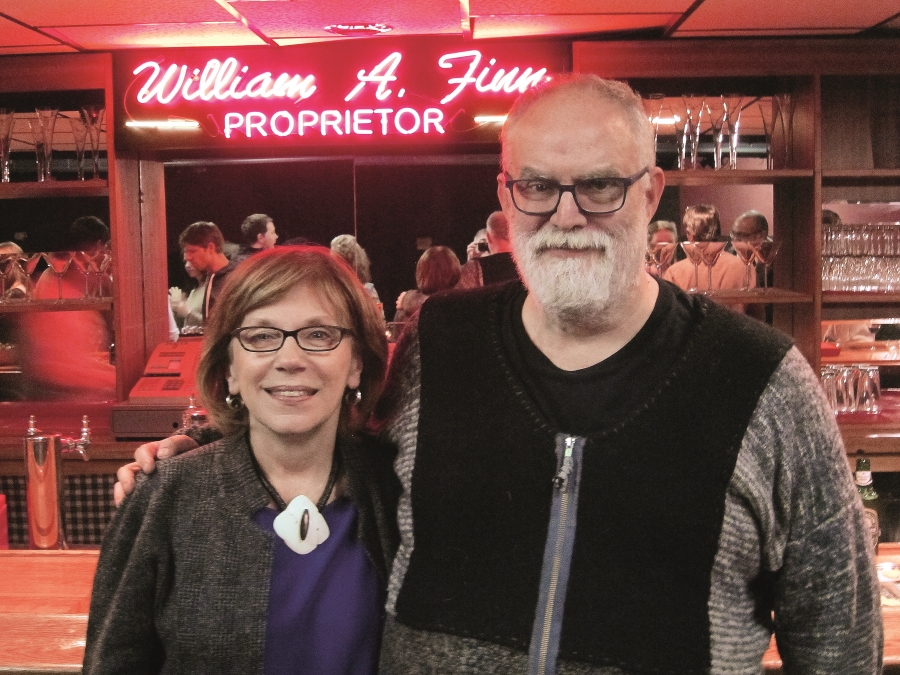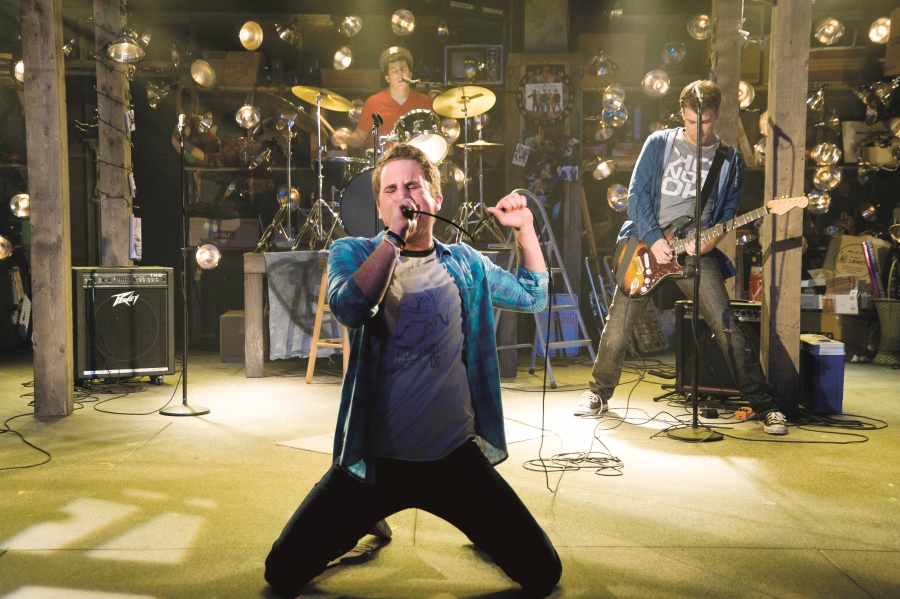The small city of Pittsfield in western Massachusetts possesses a minor claim to artistic fame: It’s the place where Herman Melville wrote Moby-Dick. But if composer William Finn has his way, this modest metropolis could acquire greater renown. “I want to make Pittsfield the epicenter of the musical-theatre-writing world,” Finn says. “Why not?”
For the past seven years, Finn, creator of such widely produced musicals as Falsettos and A New Brain, and Julianne Boyd, artistic director of Pittsfield’s Barrington Stage Company, have been working toward that goal. When The Memory Show opens at the Duke on 42nd Street in New York City this month, it will be the latest new musical to have passed through the Barrington Stage Musical Theatre Lab in the Berkshires. In its relatively short life, the Lab has established an enviable record working with creators of new musicals and presenting world premieres of their works. Among the shows launched by the Lab are The Burnt Part Boys, Calvin Berger and See Rock City & Other Destinations, all of which went on to successful runs at other theatres and have recorded cast albums.
The Lab was an idea that grew out of Finn’s own experience at Barrington Stage. Boyd had provided him space to work on The 25th Annual Putnam County Spelling Bee and had staged its debut production before the show’s high-profile move to New York in 2005. Around the time of the Broadway opening, Finn recalls, Boyd asked him, “Now, what else can I do for you?” Finn, who teaches a master class in musical-theatre writing at New York University, recalls that he initially responded, “You’ve done quite enough, thank you.” But then an idea struck him. “Actually,” he told Boyd, “I would love to have a place where my students’ work could be shown.” Out of that exchange grew the Lab, a summer program in which one or more musicals receive a workshop or a full production. The Lab staged its first world premiere, of Chris Miller and Nathan Tysen’s The Burnt Part Boys, in 2006.

The Memory Show, being produced in New York by the Transport Group, was originally a thesis project for Sara Cooper, the show’s lyricist and book writer, and composer Zach Redler. The pair was given a reading at Barrington right after graduation from Tisch School of the Arts in 2009, and they returned to the Lab the following year. A world premiere was the result.
Finn and Boyd together choose Lab participants. “We have some healthy arguments,” Boyd concedes, but when it comes to a full production (as opposed to a reading or workshop), she says they have to agree. To participate in the Lab, writers must be able to take leave from a job, if necessary, and they must have completed a full draft of their show. An unfinished work, even one of tremendous promise, isn’t enough. “You gotta know what story you’re trying to tell,” Boyd says.
“The great thing about Barrington,” Cooper observes, “is the sense that people here really want to do new work and support new writers.” She and Redler did a lot of rewriting on The Memory Show. “We added underscoring, we added an extended ending, and we cut, I believe, four songs and some parts of the book,” says the composer. “We had to tighten it up.” The musical is about the relationship between a daughter and her Alzheimer’s-stricken mother. “It’s the only show that I was willing to produce after just reading the script, because I thought it was so moving and funny,” Finn says. “I was knocked out by it.”
For Brad Alexander, the composer of See Rock City & Other Destinations (book and lyrics by Adam Mathias), the opportunity to improve that show’s script, structured as a series of vignettes, proved invaluable. “Our story about three women hiking up Mount McKinley was just not jelling,” he recalls, “so we finally came up with an entirely different story for three women.” Because the show’s three actresses were “brilliant improvisers,” Alexander adds, “they were instrumental in helping flesh the piece out.” See Rock City was eventually produced in New York by the Transport Group, earning six Drama Desk nominations (Mathias won for his book) in 2010.
Finn and Boyd provide advice on casting and support teams for all Lab shows. “Bill and Julie helped us find Leslie Kritzer and Catherine Cox,” Redler notes of The Memory Show cast. Facilities that the theatre makes available include a main stage, where some new works are presented, and a 110-seat second stage, formerly a VFW hall, which was purchased in 2010 and is “dedicated solely to either world premieres or second productions of shows that are really great and didn’t catch on, or need a little more work,” Boyd explains.
The basement of Stage 2, which houses a 40-foot oak bar, was converted into Mr. Finn’s Cabaret in 2011. The opening revue in the space, Hell Raisers, featured the music and lyrics of Joe Iconis, who’d had an Off-Broadway success with Bloodsong of Love the previous season. Iconis’s The Black Suits, an earlier musical about a teenage garage band, went into Lab development last summer, allowing the writer to revisit the show and put it “into commercial shape,” he says.
The Black Suits arrived at Barrington with a producer attached, but commercial promise is not the primary concern for Boyd. “Commercial would be fine,” she allows, citing works like Spelling Bee, Pool Boy and Calvin Berger, but Boyd is equally happy to “just get whatever they’re writing at the time.” Writers invited to the Lab must have the discipline to handle the intensity of the work. At the same time, Boyd won’t rush them. It’s a lesson she learned on Spelling Bee: “There was so much hubbub about that show, we knew the critics would wait.” In the extra time, she says, the writers “reorganized it, moved songs, did what the show needed. We want writers who feel they can deliver those changes.”

Boyd and Finn may weigh in with suggestions, but Lab productions have their own directors. “Happily, Bill didn’t try to impose himself on the material,” says Memory Show’s Cooper of her former teacher, “because I would have done pretty much whatever he said—I’m such a big fan of his.”
Alexander also praises the nurturing attitude of the Lab hosts. “It was only later in the See Rock City process that we realized we had a problem with the three sisters,” he says. “Bill sat with us in our apartment and listened to different song ideas. He asked really good and helpful questions.” As for Boyd, Alexander says, “I found her to be very supportive, but it was more than that—I felt understood.”
For his part, Finn recognizes the vulnerability of young talent that is eager to be heard. “You know,” he says, “it’s not like we’re lawyers, who go to law school and then have a job every day. We have to pretend we’re talented until people deem us talented—there’s maybe five years where you think, ‘I am going to kill myself.’ It can be a terrible, terrible time.”
In fact, Finn is presently going through the painful process of making cuts and revisions in a score of his own—for Little Miss Sunshine, based on the 2006 film and slated for workshops in April and May with an eye to a Broadway opening next season. James Lapine, who wrote the book, is directing. After Little Miss Sunshine will come The Royal Family of Broadway, a show that lay dormant for a decade after Finn lost the rights to the 1927 play by George S. Kaufman and Edna Ferber. He got them back in August 2012, and with 65 percent of the score done, he only has to wait for book writer Richard Greenberg to clear his calendar of commitments. That show’s last reading, in March 2001, featured Elaine Stritch, Donna Murphy and Brent Barrett.
Given that it’s been eight years between Spelling Bee and Sunshine, it’s unusual for Finn to have more than one show on the horizon. Apart from his “innate reluctance to say yes to things,” he says, “I have a small area of interest. I can’t write about the opening of Japan to the world. I’m writing about small families. They’re what interest me. I wish I had a greater palette on which to work, but I find it’s plenty.”
Meanwhile, both he and Boyd have major ambitions for the Lab. Boyd has established an audience for serious theatre—plays and musicals—in Pittsfield, but she expects she will challenge them with this summer’s Lab choice, Southern Comfort, which was brought to her by actor Jeff McCarthy. Set in Georgia and drawn from a documentary film, Comfort follows two transgendered people who fall in love. McCarthy and Annette O’Toole will star. Boyd is giving the show a four-week run and has panels planned on transgender issues. With a cast of 11, the musical will be the only new Lab production this season.
The main hindrance to the project’s expansion has been funding, Boyd says. In its first year, the Lab got $200,000 from a consortium of New York producers eager to support musical theatre. The following year, the Lab raised $50,000 from various sources. “Right now,” she says, “we’re raising money show by show.”
Still, she and Finn have visions of expansion. “My dream would be to have a school for musical theatre, where college kids could do totally professional musical-theatre training in the summer,” Boyd says. And Finn would like to help songwriters develop cabarets in the basement space “and then bring them into New York. I want this to be a place where you’re willing to have some adventures.”
Edward Karam is a freelance arts writer based in New York City. He was born and raised in Pittsfield, Mass.


